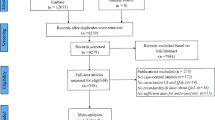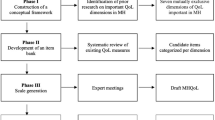Abstract
Dysphagia can have severe consequences for the patient’s health, influencing health-related quality of life (HRQoL). Sound psychometric properties of HRQoL questionnaires are a precondition for assessing the impact of dysphagia, the focus of this study, resulting in recommendations for the appropriate use of these questionnaires in both clinical practice and research contexts. We performed a systematic review starting with a search for and retrieval of all full-text articles on the development of HRQoL questionnaires related to oropharyngeal dysphagia and/or their psychometric validation from the electronic databases PubMed and Embase published up to June 2011. Psychometric properties were judged according to quality criteria proposed for health status questionnaires. Eight questionnaires were included in this study. Four are aimed solely at HRQoL in oropharyngeal dysphagia: the deglutition handicap index (DHI), dysphagia handicap index (DHI′), M.D. Anderson Dysphagia Inventory (MDADI), and SWAL-QOL, while the EDGQ, EORTC QLQ-STO 22, EORTC QLQ-OG 25 and EORTC QLQ-H&N35 focus on other primary diseases resulting in dysphagia. The psychometric properties of the DHI, DHI′, MDADI, and SWAL-QOL were evaluated. For appropriate applicability of HRQoL questionnaires, strong scores on the psychometric criteria face validity, criterion validity, and interpretability are prerequisites. The SWAL-QOL has the strongest ratings for these criteria, while the DHI′ is the most easy to apply given its 25 items and the use of a uniform scoring format. For optimal use of HRQoL questionnaires in diverse settings, it is necessary to combine psychometric and utility approaches.

Similar content being viewed by others
References
Fries JF. Aging, natural death, and the compression of morbidity. N Engl J Med. 1980;303:130–5.
Katz S. The science of quality of life. J Chronic Dis. 1987;40:459–63.
International Health Conference. Constitution of the World Health Organization. 1946. Bull World Health Organ. 2002;80:983–4.
Ware JE. The status of health assessment. Annu Rev Public Health. 1994;16:327–54.
Higginson IJ, Carr AJ. Using quality of life measures in the clinical setting. BMJ. 2001;322:1297–300.
Wilson IB, Cleary PD. Linking clinical variables with health-related quality of life: a conceptual model of patient outcomes. JAMA. 1995;273:59–65.
Smith KW, Avis NE, Assmann SF. Distinguishing between quality of life and health status in quality of life research: a meta-analysis. Qual Life Res. 1999;8:447–59.
Ferrans C, Zerwic J, Wilbur J, Larson J. Conceptual model of health-related quality of life. J Nurs Scholarsh. 2005;37:336–42.
Ferrans CE. Differences in what quality-of-life instruments measure. J Natl Cancer Inst Monogr. 2007;37:22–6.
Cook IJ, Kahrillas PJ. Technical review on management of oropharyngeal dysphagia. Gastroenterology. 1999;116:445–58.
Garcia-Peris P, Paron L, Velasco C, de la Cuerda C, Camblor M, Breton I, Herencia H, Verdaguer J, Navarro C, Clave P. Long-term prevalence of oropharyngeal dysphagia in head and neck cancer patients: impact on quality of life. Clin Nutr. 2007;26:710–7.
Ekberg O, Hamdy S, Woisard V, Wuttge-Hannig A, Ortega P. Social and psychological burden of dysphagia: its impact on diagnosis and treatment. Dysphagia. 2002;17:139–46.
Crary M, Groher ME, editors. Introduction to adult swallowing disorders. Waltham: Elsevier; 2003.
Murry T, Carrau RL, editors. Clinical management of swallowing disorders. San Diego: Plural; 2006.
Nguyen NP, Frank C, Moltz CC, et al. Impact of dysphagia on quality of life after treatment of head and neck cancer. Int J Radiat Oncol Biol Phys. 2005;61:772–8.
Campbell BH, Spinelli K, Marbella AM, et al. Aspiration, weight loss and quality of life in head and neck cancer survivors. Arch Otolaryngol Head Neck Surg. 2004;130:1100–3.
Gustafsson B, Tibbling L. Dysphagia, an unrecognized handicap. Dysphagia. 1991;6:193–9.
McHorney CA, Martin-Harris B, Robbins J, Rosenbek J. Clinical validity of the SWAL-QOL and SWAL-CARE outcome tools with respect to bolus flow measures. Dysphagia. 2006;3:141–8.
Spertus JA. Evolving applications for patient-centered health status measures. Circulation. 2008;118:2103–10.
Patrick DL, Deyo RA. Generic and disease-specific measures in assessing health status and quality of life. Med Care. 1989;27:S217–32.
Feinstein AR. Benefits and obstacles for development of health status assessment measures in clinical settings. Med Care. 1992;30:MS50–6.
Guyatt GH, Feeny DH, Patrick DL. Measuring health-related quality of life. Ann Intern Med. 1993;118:622–9.
Terwee CB, Bot SD, de Boer MR, Windt DA, van der Knol DL, Dekker J, Bouter LM, de Vet HC. Quality criteria were proposed for measurement properties of health status questionnaires. J Clin Epidemiol. 2007;60:34–42.
Timmerman AA, Meesters CM, Speyer R, Anteunis LJ. Psychometric qualities of questionnaires for the assessment of otitis media impact. Clin Otolaryngol. 2007;32:429–39.
Hassan SJ, Weymuller EA Jr. Assessment of quality of life in head and neck cancer patients. Head Neck. 1993;15:485–96.
Terrell JE, Nanavati KA, Esclamado RM, Bishop JK, Bradford CR, Wolf GT. Head and neck cancer-specific quality of life. Arch Otolaryngol Head Neck Surg. 1997;123:1125–32.
Blazeby JM, Conroy T, Hammerlid E, Fayers P, Sezer O, Koller M, Arraras J, Bottomley A, Vickery CW, Etienne PL, Alderson D. Clinical and psychometric validation of an EORTC questionnaire module, the EORTC QLQ-OES18, to assess quality of life in patients with oesophageal cancer. Eur J Cancer. 2003;39:1384–94.
Cella DF, Tulsky DS, Gray G, Sarafian B, Linn E, Bonomi A, Silberman M, Yellen SB, Winicour P, Brannon J, Eckberg K, Lloyd S, Purl S, Blendowski C, Goodman M, Barnicle M, Stewart I, McHale M, Bonomi P, Kaplan E, Taylor S IV, Thomas CR Jr, Harris J. The functional assessment of cancer therapy scale: development and validation of the general measure. J Clin Oncol. 1993;11:570–9.
Wallace KL, Middleton S, Cook IJ. Development and validation of a self-report symptom inventory to assess the severity of oral-pharyngeal dysphagia. Gastroenterology. 2000;118:678–87.
Klugman TM, Ross E. Perceptions of the impact of speech, language, swallowing and hearing difficulties on quality of life of a group of South African persons with multiple sclerosis. Fol Phoniatr Logop. 2002;54:201–21.
McHorney CA, Bricker DE, Kramer AE, Rosenbek JC, Robbins J, Chignell KA, Logemann JA, Clarke C. The SWAL-QOL outcomes tool for oropharyngeal dysphagia in adults: I conceptual foundation and item development. Dysphagia. 2000;15:115–21.
McHorney CA, Bricker DE, Robbins J, Kramer AE, Rosenbek JC, Chignell KA. The SWAL-QOL outcomes tool for oropharyngeal dysphagia in adults: II item reduction and preliminary scaling. Dysphagia. 2000;15:122–33.
McHorney CA, Robbins J, Lomax K, Rosenbek JC, Chignell K, Kramer AE, Bricker DE. The SWAL-QOL and SWAL-CARE outcomes tool for oropharyngeal dysphagia in adults: III documentation of reliability and validity. Dysphagia. 2002;17:97–114.
Chen AY, Frankowski R, Bishop-Leone J, Hebert T, Leyk S, Lewin J, Goepfert H. The development and validation of a dysphagia-specific quality-of-life questionnaire for patients with head and neck cancer. Arch Otolaryngol Head Neck Surg. 2001;127:870–6.
Woisard V, Andrieux MP, Puech M. Validation of a self-assessment questionnaire for swallowing disorders (deglutition handicap index). Rev Laryngol Otol Rhinol. 2006;127:315–25.
Silbergleit AK, Schultz L, Jacobson BH, Beardsley T, Johnson AF. The dysphagia handicap index: development and validation. Dysphagia. 2012;27:46–52.
Aaronson NK, Ahmedzai S, Bergman B, Bullinger M, Cull A, Duez NJ, Filiberti A, Flechtner H, Fleishman SB, de Haes JC. The European organization for research and treatment of cancer QLQ-C30: a quality-of-life instrument for use in international trials in oncology. J Natl Cancer Inst. 1993;85:365–76.
Vickery CW, Blazeby JM, Conroy T, Arraras J, Sezer O, Koller M, Rosemeyer D, Johnson CD, Alderson D. Development of an EORTC disease-specific quality of life module for use in patients with gastric cancer. Eur J Cancer. 2001;37:966–71.
Blazeby JM, Conroy T, Bottomley A, Vickery C, Arraras J, Sezer O, Moore J, Koller M, Turhal NS, Stuart R, van Cutsem E, D’haese S, Coens C. European organisation for research and treatment of cancer Gastrointestinal and quality of life groups. Clinical and psychometric validation of a questionnaire module, the EORTC QLQ-STO 22, to assess quality of life in patients with gastric cancer. Eur J Cancer. 2004;40:2260–8.
Lagergren P, Fayers P, Conroy T, Stein HJ, Sezer O, Hardwick R, Hammerlid E, Bottomley A, van Cutsem E, Blazeby JM. Clinical and psychometric validation of a questionnaire module, the EORTC QLQ-OG25, to assess health-related quality of life in patients with cancer of the oesophagus, the oesophago-gastric junction and the stomach. Eur J Cancer. 2007;43:2066–73.
Bjordal K, Ahlner-Elmqvist M, Tollesson E, Jensen AB, Razavi D, Maher EJ, Kaasa S. Development of a European organisation for research and treatment of cancer (EORTC) questionnaire module to be used in quality of life assessments in head and neck cancer patients. Acta Oncol. 1994;33:879–85.
Bjordal K, Hammerlid E, Ahlner-Elmqvist M, Graeff A, de Boysen M, Evensen JF, Bjorklund A, de Leeuw RJ, Fayers PM, Jannert M, Westin T, Kaasa S. Quality of life in head and neck cancer patients: validation of the European organisation for research and Treatment of cancer quality of life questionnaire-H&N35. J Clin Oncol. 1999;17:1008–19.
Jamoulle M. Traduction Française des COOP/WONCA charts (French adaptation of the COOP/WONCA charts). Brussels: FMMCSF; 1992.
Jamoulle M, Roland M, Blanc HW. Mesure de l'état fonctionnel en médecine générale: les cartes COOP/WONCA (Functional measure in general medicine: the COOP/WONCA charts). Rev Med Brux. 1994;15:329–32.
Stewart AL, Hays RD, Ware JE. The MOS short-form general health survey: reliability and validity in a patient population. Med Care. 1988;26:724–35.
Ware JE, Sherbourne CD. The MOS 36-item short-form health survey (SF-36): I. Conceptual framework and item selection. Med Care. 1992;30:473–83.
Brenner MH, Curbow B, Legro M. The proximal distal continuum in multiple health outcome measures: the case of cataract surgery. Med Care. 1995;33:AS236–44.
Wright JG. Interpreting Health-Related Quality of Life Scores - The simple rule of seven may not be so simple. Med Care. 2003;5:597–8.
Gotay CC, Korn EL, McCabe MS, Moore TD, Cheson BD. Quality-of-life assessment in cancer treatment protocols: research issues in protocol development. J Natl Cancer Inst. 1992;84:575–9.
Carr AJ, Higginson IJ. Are quality of life measures patient centred? BMJ. 2001;322:1357–60.
Bech P. Quality of life measurement in the medical setting. Eur J Psychiatry. 1995;10:83s–5s.
Guyatt GH, Kirshner B, Jaeschke R. Measuring health status: what are the necessary measurement properties? J Clin Epidemiol. 1992;45:1341–5.
Thier SO. Forces motivating the use of health status assessment measures in clinical settings and related clinical research. Med Care. 1992;30:MS15–22.
Carr AJ, Gibson B, Robinson PG. Is quality of life determined by expectations or experience? BMJ. 2001;322:1240–3.
Faden R, Leplege A. Assessing quality of life - Moral implications for clinical practice. Med Care. 1992;30:MS166–75.
Addington-Hall J, Kalra L. Who should measure quality of life? BMJ. 2001;322:1417–20.
Hays RD, Woolley JM. The concept of clinically meaningful difference in health-related quality-of-life research—how meaningful is it? Pharmaeconomics. 2000;18:419–23.
Osaba D, Brada M, Yung W, Prados M. Health-related quality of life in patients with anaplastic astrocytoma during treatment with temozolomide. Eur J Cancer. 2000;36:1788–95.
Author information
Authors and Affiliations
Corresponding author
Rights and permissions
About this article
Cite this article
Timmerman, A.A., Speyer, R., Heijnen, B.J. et al. Psychometric Characteristics of Health-Related Quality-of-Life Questionnaires in Oropharyngeal Dysphagia. Dysphagia 29, 183–198 (2014). https://doi.org/10.1007/s00455-013-9511-8
Received:
Accepted:
Published:
Issue Date:
DOI: https://doi.org/10.1007/s00455-013-9511-8




